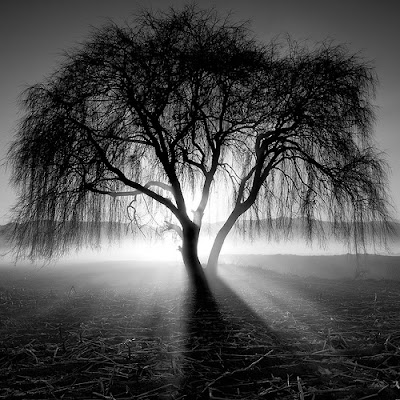Walt posted this over at a Plainly Hidden View. Below is an excerpt. The whole post may be read here.
Upright, firm and collected -- these are the three marks of that posture which is typical of the Japanese who knows how to stand, and taken together, show the presence of Hara.
Modern man in his self-assurance holds too strongly to what he believes is his by his own efforts. Not only does he not hesitate to attract attention to himself but he even emphasizes his "persona." This means that he lacks the wise restraint suitable both in social life and toward those greater forces which are present everywhere and which may suddenly fall on him and attack him. Regarding these, man is better prepared either to ward them off or deliberately to let them in, if the deep-centeredness of the soul-body posture at least counterbalances the outward thrust and striving of the mind or, better still, slightly preponderates over it.
For avoiding all postures emphasizing the ego the Japanese has one sure remedy -- his firm Hara.
-- excerpted from Hara, The Vital Center Of Man, by Karlfried Graf Durkheim

7 comments:
Hidden no more. Yikes!
"Upright, firm and collected..."
Who among us can truly understand the implications and potentialities of those three -- and manifest them? One who pursues them will never be bored.
Durkheim has been noticed elsewhere lately, as well. The book is worthy of close attention.
Thanks for the lead!
This post reminded me of a spirited argument I had with a fellow Karate-ka. Namely, just how "Japanese" should an American (or any occidental) student strive to be while studying a Japanese art? (Yes, I am committing the sin of roping in Okinawa with Japan ^_^)
I'll summarize my feelings by quoting Polonius, "To thine own self be true".
-Brett
When I trained in aikido years ago, there were quite a number of students who began to speak in broken English, in imitation of our teacher.
It's a wacky world.
Rick,
The first time I ever heard of such a thing was when I read, "Sensei" by Donohue. I've never personally observed this so I don't know if it would be more funny, or sad, to me, to watch a native english speaker begin to speak in broken english.
My instructor's english is pretty rough too (except he's Puerto Rican). And as much as I'd like to emulate him, I couldn't imagine adopting his speech pattern.
...Each their own, I guess.
-Brett
r..."began to speak in broken English, in imitation of our teacher." That's quite oriental in orientation - never show yourself more proficient than your teacher in whatever aspect (incidentally that also happen in some offices (even in HK) where even the most stupid joke from the boss will be responded with much laughter and adoring eyes (esp from the young ladies who are seeking for the next promotion, if the boss is a middle-aged man) ...:):)
Sometimes it is nice to be upright, firm and collected; sometimes a spiritual man may just need to relax a bit...:):)
Brett's quote from Hamlet is right on the money. To thine own self be true.
Post a Comment